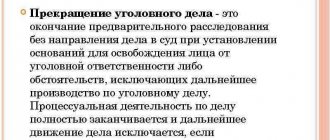The court and its role in criminal proceedings.
The adversarial criminal process is characterized by the preservation of the public principle with the provision of broad rights to its main participants. The essence of the adversarial criminal process is manifested in procedural features, which in general represent it as a “competition” of equal parties before an impartial court. In the science of criminal procedure, it is generally accepted that the function of the court at the trial stage is to administer justice by resolving a criminal case. Therefore, it is necessary to consider the concept of justice (in relation to criminal proceedings).
In accordance with paragraph 57 of Art. 5 of the Code of Criminal Procedure of the LPR, a court hearing is a procedural form of administering justice during pre-trial and judicial proceedings in a criminal case. In other words, in criminal proceedings, the activities of the court in any court hearing, the exercise of any powers of the court are recognized as the implementation of justice.
An essential feature of justice in criminal cases, inherent in it at all stages of development, is that it is carried out in a special procedural form, acting as a guarantee of the rights and legitimate interests of participants in the process and the main method of criminal procedural regulation. justice is only such activity of the court, the procedural form of which presupposes the mandatory participation of interested participants in the criminal process or at least their representatives, providing them with extremely broad procedural guarantees that ensure the correct solution of the most important issues of the criminal case - guilt and punishment.
Thus, the main function of the court in criminal proceedings is to administer justice in criminal cases. By implementing this function, the court, in accordance with the principle of equality and adversarial rights of the parties, resolves the dispute between the prosecution and defense, acting as an arbitrator.
The powers exercised by the court in criminal proceedings can be divided into the following groups:
· 1. The powers of the court to administer justice (resolve criminal cases on the merits). Only the court has the power to:
· 1) find a person guilty of committing a crime and impose punishment on him.
2) the exclusive powers of the court in criminal proceedings include its right to apply compulsory medical measures to a person.
3) the exclusive right of the court in criminal proceedings is its right to apply a compulsory educational measure in relation to a minor who has committed a crime of minor or medium gravity for the first time (if his correction can be achieved without applying punishment),
) only a court has the right to cancel or change a decision made by a lower court.
2. Powers of the court to control pre-trial proceedings.
Only the court is given the right to make decisions allowing for the restriction of the most important constitutional rights of citizens in the performance of certain procedural actions. Thus, only the court has the right to decide:
· 1) on the selection of a preventive measure in the form of detention, house arrest, bail;
· 2) on extending the period of detention;
· 3) placement of a suspect, accused, who is not in custody, in a medical or psychiatric hospital for a forensic medical or forensic psychiatric examination, respectively;
· 4) compensation for property damage;
· 5) conducting an inspection of the home in the absence of the consent of the persons living in it;
· 6) conducting a search and (or) seizure of a home;
· 7) confiscation of an item pawned or deposited in a pawnshop;
· conducting a personal search, except as otherwise provided;
· 9) seizing items and documents containing state or other secrets protected by federal law, as well as items and documents containing information on deposits and accounts of citizens in banks and other credit organizations;
· 10) seizure of correspondence, permission to inspect and seize it in communication institutions;
· 11) seizure of property, including funds of individuals and legal entities held in accounts and deposits or deposited in banks and other credit organizations;
· 12) temporary removal of the suspect or accused from office in accordance with Art. 114 Code of Criminal Procedure;
· 13) control and recording of telephone and other conversations;
· 14) sale or destruction of material evidence;
· 15) receiving information about connections between subscribers and (or) subscriber devices.
If, during the judicial consideration of a criminal case, circumstances are revealed that contributed to the commission of a crime, violations of the rights and freedoms of citizens, as well as other violations of the law committed during the inquiry, preliminary investigation or during the consideration of the criminal case by a lower court, then the court has the right to issue a private ruling or resolution, which draws the attention of relevant organizations and officials to these circumstances and facts of violations of the law that require taking the necessary measures. The court has the right to issue a private ruling or ruling in other cases if it finds it necessary.
The administration of justice in criminal cases in the Russian Federation is carried out by professional judges and, in certain cases established by law, by citizens involved in the administration of justice who act as jurors in the process.
Criminal cases are considered by the court collectively or by a single judge. The composition of the court for consideration of a particular case is formed taking into account the workload and specialization of judges in a manner that excludes influence on its formation by persons interested in the outcome of the trial, including using an automated information system.
The composition of the court when considering criminal cases is determined based on the severity of the crime committed, the type and amount of possible punishment, jurisdiction and the specific procedural tasks of courts of various instances.
Consideration of a case in cassation and supervisory courts is possible only collegially and by professional judges - three professional judges in the cassation court and a composition of at least three judges in the supervisory court.
The adversarial criminal process is characterized by the preservation of the public principle with the provision of broad rights to its main participants. The essence of the adversarial criminal process is manifested in procedural features, which in general represent it as a “competition” of equal parties before an impartial court. In the science of criminal procedure, it is generally accepted that the function of the court at the trial stage is to administer justice by resolving a criminal case. Therefore, it is necessary to consider the concept of justice (in relation to criminal proceedings).
In accordance with paragraph 57 of Art. 5 of the Code of Criminal Procedure of the LPR, a court hearing is a procedural form of administering justice during pre-trial and judicial proceedings in a criminal case. In other words, in criminal proceedings, the activities of the court in any court hearing, the exercise of any powers of the court are recognized as the implementation of justice.
An essential feature of justice in criminal cases, inherent in it at all stages of development, is that it is carried out in a special procedural form, acting as a guarantee of the rights and legitimate interests of participants in the process and the main method of criminal procedural regulation. justice is only such activity of the court, the procedural form of which presupposes the mandatory participation of interested participants in the criminal process or at least their representatives, providing them with extremely broad procedural guarantees that ensure the correct solution of the most important issues of the criminal case - guilt and punishment.
Thus, the main function of the court in criminal proceedings is to administer justice in criminal cases. By implementing this function, the court, in accordance with the principle of equality and adversarial rights of the parties, resolves the dispute between the prosecution and defense, acting as an arbitrator.
The powers exercised by the court in criminal proceedings can be divided into the following groups:
· 1. The powers of the court to administer justice (resolve criminal cases on the merits). Only the court has the power to:
· 1) find a person guilty of committing a crime and impose punishment on him.
2) the exclusive powers of the court in criminal proceedings include its right to apply compulsory medical measures to a person.
3) the exclusive right of the court in criminal proceedings is its right to apply a compulsory educational measure in relation to a minor who has committed a crime of minor or medium gravity for the first time (if his correction can be achieved without applying punishment),
) only a court has the right to cancel or change a decision made by a lower court.
2. Powers of the court to control pre-trial proceedings.
Only the court is given the right to make decisions allowing for the restriction of the most important constitutional rights of citizens in the performance of certain procedural actions. Thus, only the court has the right to decide:
· 1) on the selection of a preventive measure in the form of detention, house arrest, bail;
· 2) on extending the period of detention;
· 3) placement of a suspect, accused, who is not in custody, in a medical or psychiatric hospital for a forensic medical or forensic psychiatric examination, respectively;
· 4) compensation for property damage;
· 5) conducting an inspection of the home in the absence of the consent of the persons living in it;
· 6) conducting a search and (or) seizure of a home;
· 7) confiscation of an item pawned or deposited in a pawnshop;
·
· 9) seizing items and documents containing state or other secrets protected by federal law, as well as items and documents containing information on deposits and accounts of citizens in banks and other credit organizations;
· 10) seizure of correspondence, permission to inspect and seize it in communication institutions;
· 11) seizure of property, including funds of individuals and legal entities held in accounts and deposits or deposited in banks and other credit organizations;
· 12) temporary removal of the suspect or accused from office in accordance with Art. 114 Code of Criminal Procedure;
· 13) control and recording of telephone and other conversations;
· 14) sale or destruction of material evidence;
· 15) receiving information about connections between subscribers and (or) subscriber devices.
If, during the judicial consideration of a criminal case, circumstances are revealed that contributed to the commission of a crime, violations of the rights and freedoms of citizens, as well as other violations of the law committed during the inquiry, preliminary investigation or during the consideration of the criminal case by a lower court, then the court has the right to issue a private ruling or resolution, which draws the attention of relevant organizations and officials to these circumstances and facts of violations of the law that require taking the necessary measures. The court has the right to issue a private ruling or ruling in other cases if it finds it necessary.
The administration of justice in criminal cases in the Russian Federation is carried out by professional judges and, in certain cases established by law, by citizens involved in the administration of justice who act as jurors in the process.
Criminal cases are considered by the court collectively or by a single judge. The composition of the court for consideration of a particular case is formed taking into account the workload and specialization of judges in a manner that excludes influence on its formation by persons interested in the outcome of the trial, including using an automated information system.
The composition of the court when considering criminal cases is determined based on the severity of the crime committed, the type and amount of possible punishment, jurisdiction and the specific procedural tasks of courts of various instances.
Consideration of a case in cassation and supervisory courts is possible only collegially and by professional judges - three professional judges in the cassation court and a composition of at least three judges in the supervisory court.
The court as a participant in criminal proceedings
This article examines the legal aspect of the court as a participant in criminal proceedings, and also highlights the controversial issue related to the attribution of the court to a separate, independent, central type, as a participant in criminal proceedings. Based on the research, specific conclusions are drawn that are reflected in the article.
Key words: participant in criminal proceedings, court, judge, Criminal Procedure Code of the Russian Federation.
At the moment, the court (judge) plays the most important role in criminal proceedings; it is not only the central participant in the criminal process, but also the government body that administers justice in criminal proceedings, that is, it considers and resolves criminal cases on the merits in judicial proceedings.
But in order to understand in detail the issues of the exercise of judicial power in criminal proceedings, it is necessary to analyze from the point of view of the legal status of the court as a participant in criminal procedural relations.
Thus, the definition of “court” in its content and meaning can be classified as combined. On the one hand, the court belongs to the state bodies, the totality of which forms the judicial system, which implements an independent branch of state power (Article 1 of the Federal Constitutional Law “On Courts of General Jurisdiction”), on the other hand, the judge, according to paragraph 48 of Art. 5 of the Code of Criminal Procedure of the Russian Federation is a bearer who has the right to consider a criminal case on the merits and make decisions on behalf of the Russian Federation.
In the legislation of our country, this concept of “court” is used when constructing the norms of the Criminal Procedure Code of the Russian Federation (hereinafter referred to as the Code of Criminal Procedure of the Russian Federation).
In particular, when determining jurisdiction (Articles 30, 31 of the Code of Criminal Procedure of the Russian Federation) [1], the court is a body, or in other cases - an official, entering into legal relations with other participants in the criminal process. Thus, in some cases, the term “court” is clarified in relation to specific officials of the magistrate, the presiding judge, the Chairman of the court, and his deputies
The court, as a state body of justice, belongs to the group or participants in criminal proceedings who conduct criminal proceedings, in other words, leads the process.
K. F. Gutsenko argues that these subjects can be called central or participants in legal proceedings as subjects who perform the main procedural functions. Their main properties are considered to be that they are carriers of official or personal interest in the outcome of a particular case and can influence its occurrence and progress towards the finish line provided for by law. These include the court, participants from the prosecution and participants from the defense [2].
It is important to note that some legal scholars identify courts (judges) as a separate independent group of participants in criminal proceedings [3]. This is determined by the fact that they are entrusted with the function of resolving the case. The essence of this function is reflected in Part 1 of Art. 118 of the Constitution of the Russian Federation and Art. 8 of the Code of Criminal Procedure of the Russian Federation, which established that only the court is given the authority to administer justice by examining criminal cases and issuing verdicts, according to which persons brought to criminal liability can be recognized as having committed crimes and subjected to criminal punishment.
These powers cannot be exercised by any court, but only by those that are classified as courts of general jurisdiction [4].
It can be argued that the court is a separate participant in the criminal process [5]. But it would be more correct to say that the court is one of the participants in the criminal process, since this is indicated in the Code of Criminal Procedure of the Russian Federation.
Let us note that the implementation of the relationship between the court and the parties is determined by the state power of the court, with the implementation of individual rights in criminal proceedings and with the protection of these rights [6].
The main role of courts (judges) in criminal procedural legal relations is also determined by the fact [7] that, along with the powers to administer justice, they are entrusted with such rights as control over the legality and validity of the actions and decisions of the bodies of inquiry and investigation at the pre-trial stages [ 8].
Thus, having examined the court (judge), as a participant in the criminal process, it can be argued that he plays an integral part in the criminal process, which considers criminal cases on the merits, and also makes decisions provided for by the Code of Criminal Procedure of the Russian Federation.
Literature:
- Criminal Procedure Code of the Russian Federation dated December 18, 2001 No. 174-FZ (as amended on December 8, 2020) (as amended and supplemented, entered into force on December 19, 2020) // SZ RF 2001, No. 24, Art. 1682;
- Criminal procedure: a textbook for students of law universities and faculties / Ed. Gutsenko K. F. M.: Moscow State University; Mirror, 2007. P. 131.
- Kachalova, O. V. Functions of the court in modern Russian criminal proceedings / O. V. Kachalova // Russian judge. 2014. No. 1. P. 8–10.
- Bannikov, I. A. The principle of administering justice only by the court: historical and legal aspect / I. A. Bannikov // Arbitration and civil process. 2022. No. 2. P. 52–57.
- Problems of the criminal process in Russia. Collection of articles / Zinatullin Z. Z. - Izhevsk: Detective-inform, 2008. - 284 p.
- Tarasov A. A., Gizatullin I. A. Independence of judges - an immanent property of criminal justice and its global problem // Bulletin of RUDN University. Legal sciences. 2022. No. 1. URL: https://cyberleninka.ru/article/n/nezavisimost-sudey-immanentnoe-svoystvo-ugolovnogo-pravosudiya-i-globalnaya-ego-problema (access date: 02/01/2021).
- Gutsenko K. F. The concept of legal proceedings // Criminal proceedings / Ed. K. F. Gutsenko. M.: IKD “Zertsalo-M”, 2009–829 p.
- Ryabtseva, E. V. Justice in the criminal process of Russia: monograph / E. V. Ryabtseva. — 2nd ed., add. - Moscow: Yurlitinform, 2010. - 400 p.
- The independence of judges is an inherent property of criminal justice and its global problem // Bulletin of RUDN University. Series: Legal sciences. 2022. No. 1. URL: https://cyberleninka.ru/article/n/nezavisimost-sudey-immanentnoe-svoystvo-ugolovnogo-pravosudiya-i-globalnaya-ego-problema (date of access: 02.25.2021).






